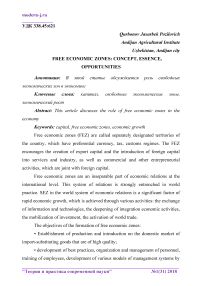Free economic zones: concept, essence, opportunities
Автор: Qurbonov J.P.
Журнал: Теория и практика современной науки @modern-j
Рубрика: Международные экономические отношения
Статья в выпуске: 1 (31), 2018 года.
Бесплатный доступ
This article discusses the role of free economic zones in the economy.
Capital, free economic zones, economic growth
Короткий адрес: https://sciup.org/140289455
IDR: 140289455
Текст научной статьи Free economic zones: concept, essence, opportunities
Free economic zones (FEZ) are called separately designated territories of the country, which have preferential currency, tax, customs regimes. The FEZ encourages the creation of export capital and the introduction of foreign capital into services and industry, as well as commercial and other entrepreneurial activities, which are joint with foreign capital.
Free economic zones are an inseparable part of economic relations at the international level. This system of relations is strongly entrenched in world practice. SEZ in the world system of economic relations is a significant factor of rapid economic growth, which is achieved through various activities: the exchange of information and technologies, the deepening of integration economic activities, the mobilization of investment, the activation of world trade.
The objectives of the formation of free economic zones:
-
• Establishment of production and introduction on the domestic market of import-substituting goods that are of high quality;
-
• development of best practices, organization and management of personnel, training of employees, development of various models of management systems by
the economy, development of the functional side of individual economic entities in the market environment;
-
• intensification of the rapid growth of the export potential of the economic zone;
-
• encouraging the economic development of the regions surrounding the territory of the free economic zone with the use of foreign capital.
The creation of suitable conditions makes the free economic zones an important factor in the country's economic development, which accelerates the incorporation of the national economy into world economic relations, and also stimulates the development of the country's economy as a whole. In fact, SEZs act as poles of economic growth. This is an active tool for managing external economic ties at the level of regional policy and state level.
Types of FEZ in terms of functionality:
-
• offshore zones where preferential tax, currency, registration and banking conditions for foreign citizens are created on the intentionally allocated territories;
-
• complex production zones, which are organized, first of all, for the export production of consumer goods that do not require material-intensive costs;
-
• Technopolis and technology parks, which are organized with the focus on the creation and development of innovative technologies;
-
• foreign trade zones where there can be a combination of duty-free trade and development of transport, warehouse services and export production.
The reasons for the formation of free economic zones.
SEZs are created in industrialized countries in regions with economic decline with the aim of restoring medium and small businesses and thus balancing interregional differences. The enterprises of such regions receive the maximum tax privileges. Free economic zones - an instrument of regional policy, which is used in those areas of countries where an increase in the economic level is required, as well as the level of social welfare.
When selecting a region for the establishment of a free economic zone, measures such as the income level of the population of the region and the level of unemployment are used.1
Developing countries, in contrast to industrialized countries, make the main emphasis on achieving a higher level of industrialization: improving the industry, attracting foreign capital, building up the skills of workers, introducing new technologies.
Used sources:
-
1. The Cabinet of Ministers of the Republic of Uzbekistan adopted Resolution No. 106 of April 10, 2017, "On measures to organize the activities of free economic zones,"
-
2. Alexey Kireev. International Economics. Part one. Moscow. International relationships. 2000
-
3. Scientific and Practical Journal The market, money and credit, 12/2012.
-
4. .World economy. O.V. Kornienko. M: Peter. 2010.
-
5. Умарова Г. Ш. Роль иностранных инвестиций в развитии национальной экономики //International scientific journal. – 2016. – №. 3. – С. 148-149.
Список литературы Free economic zones: concept, essence, opportunities
- The Cabinet of Ministers of the Republic of Uzbekistan adopted Resolution No. 106 of April 10, 2017, "On measures to organize the activities of free economic zones,"
- Alexey Kireev. International Economics. Part one. Moscow. International relationships. 2000
- Scientific and Practical Journal The market, money and credit, 12/2012.
- World economy. O.V. Kornienko. M: Peter. 2010.
- Умарова Г. Ш. Роль иностранных инвестиций в развитии национальной экономики //International scientific journal. - 2016. - №. 3. - С. 148-149.


